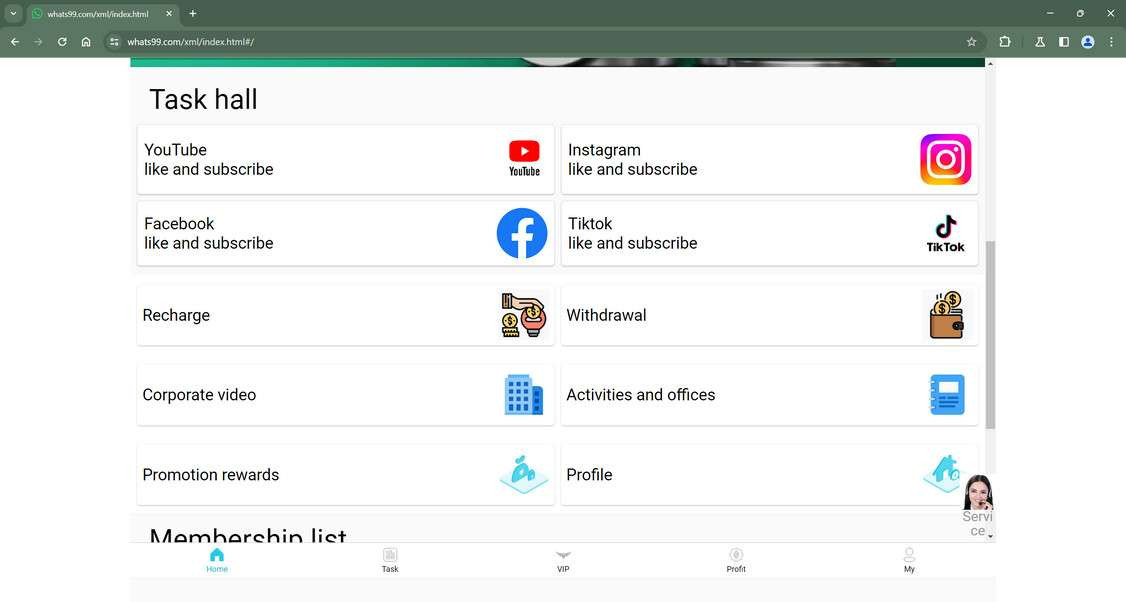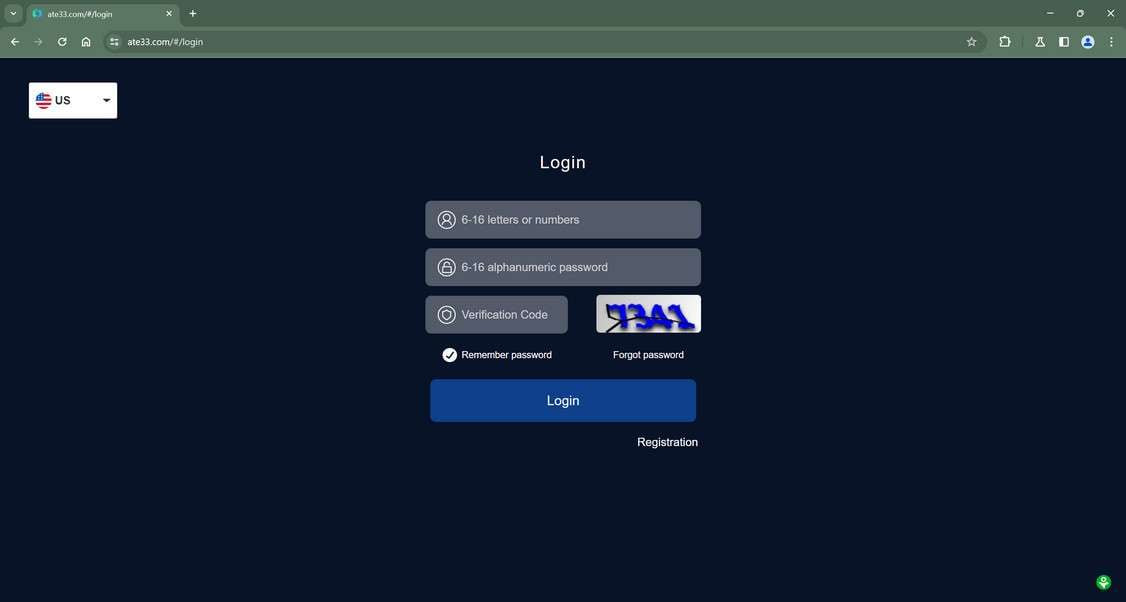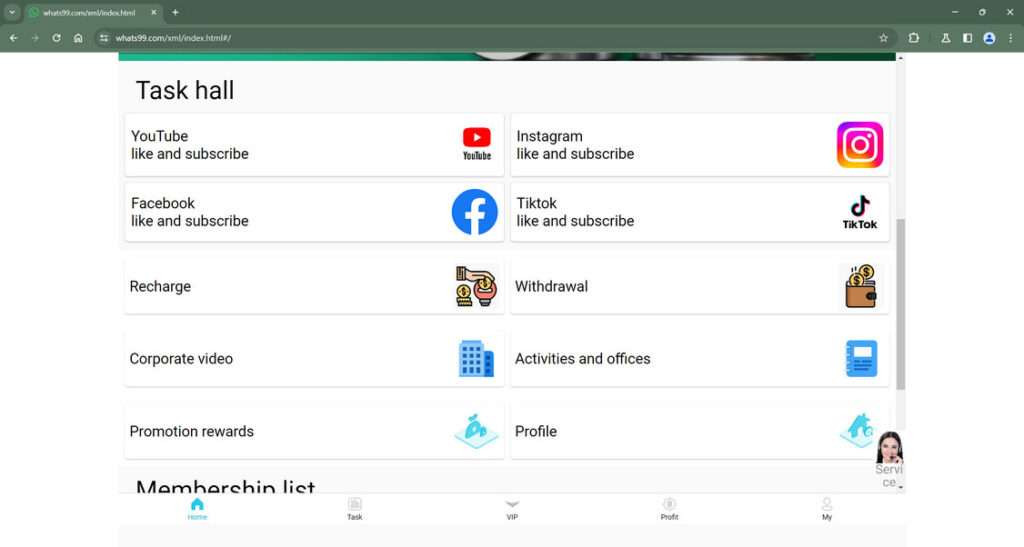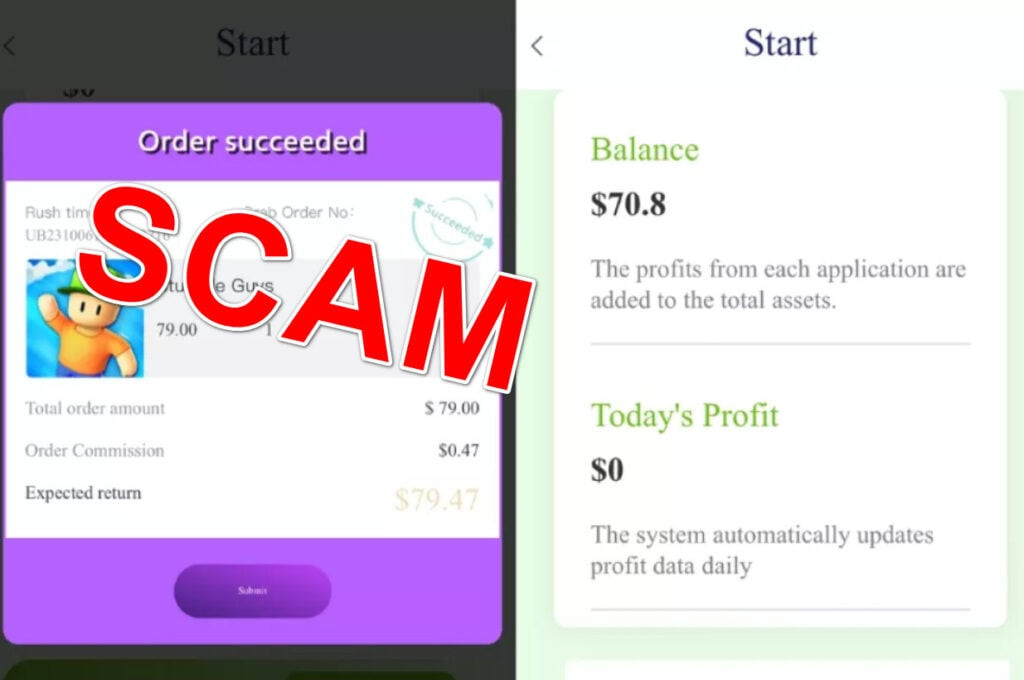In today’s challenging job market, the allure of remote work and quick income can be incredibly tempting. Unfortunately, scammers are exploiting this very desire, preying on job seekers with sophisticated schemes. One such deceptive operation making the rounds is the fake Bright Pioneer Consulting recruitment scam.
Operating through unsolicited spam emails, text messages, and social media lures, these fraudsters promise enticingly high salaries and benefits for seemingly straightforward “work-from-home” roles like customer service or data entry. However, the advertised “job” is nothing more than an elaborate facade designed to extract money from unsuspecting victims.
This article delves into the intricate workings of the fake Bright Pioneer Consulting recruitment scam. By understanding the tactics and psychological manipulation employed by these criminals, job seekers can better equip themselves to recognize and avoid this malicious trap.
 Job Scam 3
Job Scam 3
 Job Scam 1
Job Scam 1
 Job Scam 2
Job Scam 2
Unmasking the Scam: An Overview
The Bright Pioneer Consulting job offer scam thrives on deception, falsely associating itself with the name of a legitimate entity, Bright Pioneer Consulting. It’s crucial to emphasize that the real Bright Pioneer Consulting company has absolutely no connection to this fraudulent scheme. Scammers illegitimately leverage the name to send out deceptive messages promoting nonexistent customer service or data entry positions, aiming to defraud job seekers.
These scam job postings often manifest as brief, vague messages delivered via SMS, email, various social media platforms, online job boards, or messaging applications. Examples of these enticing yet misleading messages include:
- “Customer service agent role open. Immediate interview for $24/hour remote work. Apply now!”
- “Data entry clerk position – your resume is a perfect match. Exceptional benefits package. Text us to schedule your interview.”
- “Remote customer service roles available nationwide. No experience? No problem! Message us to learn more about this exciting opportunity.”
These messages frequently appear unexpectedly, often referencing a supposed application or resume submission by the recipient. To enhance the perceived legitimacy, scammers sometimes acquire stolen resumes and contact lists from dark web cybercrime marketplaces. This allows them to include personal details in their messages, making them seem like genuine recruitment efforts.
In other instances, these scammers employ mass spamming techniques, sending out millions of messages to phone numbers, email addresses, and social media accounts indiscriminately. Exploiting the large number of individuals actively seeking employment, they gamble on a certain percentage falling for the bait.
 Scam Whatsapp Job
Scam Whatsapp Job
To further pique interest, these messages often highlight seemingly irresistible job features:
- Work from home: Eliminate commuting and relocation hassles.
- Flexible hours: Design your own work schedule.
- High hourly wages: Earn $20-$30 per hour with rapid “pay increases.”
- Comprehensive benefits: Access health/dental insurance, 401K plans, and paid time off.
- No experience required: Complete training provided.
- Convenient online training: Training conducted entirely remotely.
- Advanced training tools: Utilize cutting-edge software and resources.
For someone facing unemployment and urgent financial needs, these offers can appear incredibly appealing, almost too good to be true. Regrettably, this is precisely the case. Scammers capitalize on victims’ hopefulness and confirmation bias, leading them to disregard potential warning signs.
If a job seeker expresses interest, they are instructed to continue the “hiring” process via encrypted messaging apps like WhatsApp, Signal, or Telegram. This strategic move allows scammers to mask their identities and operate with anonymity, making it harder to trace their fraudulent activities.
The core of the scam lies in an elaborate fake job interview conducted through these messaging apps. Applicants are deceptively instructed to complete peculiar “training” by accessing specialized software portals. However, these systems are actually sophisticated mechanisms designed to steal cryptocurrency directly from the victims.
 Job Scam 3
Job Scam 3
Once funds are successfully extracted, the WhatsApp/Telegram contacts, training portal domains, and any other online presence established by the scammers abruptly disappear, leaving no trace. Millions of dollars in stolen cryptocurrency are then laundered through intricate networks, effectively vanishing forever.
Victims are left emotionally and financially devastated, with minimal avenues for recourse. The scammers utilize fabricated names linked to disposable messaging accounts. The training portals and domains are registered anonymously or using stolen identities. Crucially, all payments are conducted through irreversible cryptocurrency channels, making recovery virtually impossible.
Continue reading to understand the detailed methods employed by this scam to deceive its victims.
Deconstructing the Scam: Step-by-Step Tactics of the Fake Bright Pioneer Consulting Job Offer
The Bright Pioneer Consulting job offer scam effectively traps victims by employing sophisticated social engineering techniques across various communication channels. Here’s a detailed breakdown of how this elaborate con unfolds:
Step 1: Casting a Wide Net with Spam Messages
Scammers initiate the process by sending out mass spam emails and text messages advertising the fictitious customer service job opportunity. Concise messages are often used to maximize responses, such as:
“Your resume is a strong match for a remote work opportunity at our company. Salary starts at $24/hr. Text us back for more information.”
This intentionally vague messaging is designed to attract the broadest possible audience of job seekers.
In other instances, scammers enhance their apparent legitimacy by purchasing or stealing actual resumes and contact lists. This allows them to personalize messages with details from a victim’s resume, previous work history, or skill set, increasing the likelihood of engagement.
Beyond emails and texts, the scammers also saturate social media platforms like Facebook, Instagram, and LinkedIn with posts promoting these nonexistent job openings, further expanding their reach.
Step 2: Shifting Communication to Anonymous Platforms
When a recipient responds with interest in the advertised role, the scammers immediately attempt to transition the conversation to more anonymous and less traceable platforms like WhatsApp or Telegram.
Their initial response often includes a message similar to:
“Thank you for your interest in Bright Pioneer Consulting! To schedule your immediate interview, please contact our hiring manager, Vivian Hughes, on WhatsApp at [phone number].”
Conducting conversations via WhatsApp or Telegram provides scammers with a crucial layer of anonymity, shielding their true identities and allowing them to operate with reduced risk of detection.
Step 3: The Deceptive “Interview” Process
The fake job interview is the central component of the scam. Once communication is established on WhatsApp or Telegram, the applicant is contacted by an individual impersonating a hiring manager or interviewer.
After posing a few superficial questions about the applicant’s resume and career interests, the fraudulent interviewer proceeds to explain the unusual requirements of this “work-from-home” position:
- Online “training” is mandatory and must be completed using specialized software programs. This training is presented as a substitute for traditional onboarding procedures.
- The “training software” requires “access passes” that must be purchased using Bitcoin, ETH, USDT, or other cryptocurrencies. Applicants are reassured that these fees will be fully reimbursed by the company after training completion.
- Each training module completed supposedly adds funds to the applicant’s online account balance. Upon successful completion of the entire training program, these accumulated “wages,” including the reimbursement, can be withdrawn.
Applicants are then provided with links to the “training portal,” which is, in reality, a meticulously crafted scam website designed solely to steal cryptocurrency payments.
Step 4: The Cryptocurrency-Based Training Portal
The training portal, often hosted on generic domains with extensions like “.shop” or “.vip,” presents a superficial appearance of a legitimate web application. It typically includes a login page, an account dashboard, and a menu of seemingly structured “training modules.”
 Job Scam 1
Job Scam 1
These modules instruct users to perform trivial and meaningless tasks, such as:
- Watching online videos (often unrelated or generic content)
- Liking social media posts (designed to boost scammer profiles)
- Downloading various mobile applications (potentially malicious or data-harvesting apps)
- “Purchasing” products (often through fake or affiliate links benefiting scammers)
After completing each of these pointless tasks, the user’s account balance within the fake portal deceptively increases. However, upon accumulating a certain amount, the system prompts the user to “recharge” their account with cryptocurrency to unlock further modules and continue the “training.”
These “access pass” prices typically range from $50 to $500, payable in Bitcoin, Ethereum, Tether, or other cryptocurrencies. If the victim makes the payment, the cycle repeats: more meaningless tasks, a growing fake balance, and then another demand for cryptocurrency to “recharge” and continue. This continues until the victim is either completely drained of funds or finally recognizes the deceptive nature of the scheme.
Step 5: The Sudden Disappearance
Once a victim realizes they have been scammed, or when they refuse to pay further cryptocurrency “fees,” the scammers abruptly cease all communication and vanish without a trace.
The WhatsApp numbers, Telegram contacts, training portal website, and any other online presence they had established are swiftly deleted or deactivated. Just as suddenly, the stolen cryptocurrency disappears, typically routed through complex money laundering systems to obscure its origin and destination.
The victim is left feeling distressed, ashamed, and financially ruined. The scammer then simply moves on to repeat the identical process with their next unsuspecting target, perpetuating the cycle of fraud.
Variations on the Upfront Fee Tactic
In some reported instances of the Bright Pioneer Consulting job scam, fraudsters may deviate slightly from the “training portal” approach and directly request victims to pay an upfront “processing fee” or “equipment fee” before commencing the fake online training.
After moving the conversation to WhatsApp or Telegram, the scammer posing as the hiring manager might inform the applicant:
“Congratulations on moving forward in the hiring process for the customer service role! We are excited to welcome you to our team and begin your training. The final step before we activate your training account is a $200 processing fee. Please let me know once you have submitted the fee, and we can proceed with your training setup.”
In other variations, the scammers may claim that the victim needs to purchase specific computer equipment or software to adequately complete the remote training:
“Fantastic news, you’ve been officially hired! As the final step, you will need to acquire the necessary computer equipment for this work-from-home position. Please purchase the items listed below, totaling $500, through our approved vendor. Send me the order confirmation, and I will finalize your training login credentials.”
The scammers then provide payment instructions, typically requesting wire transfers, gift card purchases, or prepaid debit card transactions.
However, regardless of the specific pretext – “processing fee” or “equipment fee” – the outcome is the same. Once the upfront payment is made, the scammers abruptly cut off all communication and abscond with the money. No training or job ever materializes.
These upfront fee variations demonstrate the adaptability of scammers, who continuously evolve their tactics to ensnare victims within the Bright Pioneer Consulting recruitment scam. Job seekers must remain vigilant and wary of any recruiter who demands payments before the official commencement of training or employment. Legitimate companies do not operate in this manner. If you encounter pressure to pay upfront fees, immediately terminate all communication and report the suspicious activity.
Steps to Take if You’ve Been Targeted
If you have unfortunately engaged with these scammers and suffered financial losses, here are crucial steps you should take immediately:
Step 1: Thoroughly Document Everything
Begin by gathering all available evidence related to your experience with the scam. This documentation should include:
- Complete chat logs of your entire conversation history with the scammers. Take screenshots of all messages, including dates and times.
- The original job scam emails, text messages, or social media posts that initially drew you in.
- Screenshots of all pages within the fraudulent training portal, including module descriptions and tasks.
- Records of any cryptocurrency transactions you made, including transaction IDs, dates, and amounts.
Preserving this comprehensive documentation is vital, as it can significantly aid law enforcement agencies in tracking down and prosecuting the criminals responsible for this scam.
Step 2: Report the Scam to the Authorities
File detailed reports about the scam incident with all relevant government and regulatory agencies:
- Contact your local police department immediately. Provide them with all the evidence you have collected and request an official incident report number.
- Submit a formal complaint to the FBI’s Internet Crime Complaint Center (IC3) through their website: www.ic3.gov.
- Contact the Federal Trade Commission (FTC) via their online reporting tool or by phone at 877-FTC-HELP (877-382-4357).
- If you used Coinbase or another cryptocurrency exchange for payments, report the scam to their customer support. Many exchanges have dedicated teams that investigate crypto-related scams.
- Alert the social media platforms (WhatsApp, Telegram, Instagram, Facebook, etc.) where you encountered the scammer’s initial outreach or communication.
Step 3: Notify Your Financial Institutions
Contact your bank and any other financial institutions that may be linked to the fraudulent transactions or accounts potentially compromised during the scam. Inform them that your accounts may have been targeted by fraud.
Discuss your options for potentially recovering lost funds, canceling compromised credit/debit cards or accounts, or disputing any fraudulent charges. Prompt action can minimize further financial damage.
Step 4: Enhance Your Online Security
Take immediate steps to bolster your online security and protect your accounts to prevent future victimization:
- Change all your passwords, security questions, and enable two-factor authentication (2FA) on every online account possible, especially financial and email accounts.
- Remove or limit the amount of personal information visible on your public online profiles that scammers could potentially exploit for social engineering.
- Block all contacts, phone numbers, and email addresses associated with the scam to prevent further communication attempts.
Maintaining heightened vigilance and proactively strengthening your online security posture are crucial steps in deterring future scam attempts as you continue your job search.
Frequently Asked Questions About the Bright Pioneer Consulting Job Scam
The Bright Pioneer Consulting recruitment scam has unfortunately deceived numerous job seekers through its clever social engineering tactics. Here are answers to some frequently asked questions to provide greater clarity about this pervasive con:
What Exactly is the Bright Pioneer Consulting Job Scam?
The Bright Pioneer Consulting recruitment scam is a deceptive work-from-home job offer specifically designed to steal money from job applicants. Scammers falsely present themselves as representatives of the legitimate “Bright Pioneer Consulting” company and distribute messages advertising roles such as customer service representatives, brand ambassadors, or data entry clerks. They then trick victims into paying cryptocurrency “fees” for access to nonexistent online “training.”
How Do Scammers Initially Contact Potential Victims?
Scammers employ a wide-reaching approach, utilizing spam text messages, emails, social media posts, and direct messages to advertise remote job opportunities at Bright Pioneer Consulting. Their messages are intentionally vague yet enticing, promising high salaries, attractive benefits packages, and flexible working hours to lure potential targets.
Which Communication Platforms Do They Utilize?
While the initial outreach may occur via mass spam texts, emails, job boards, or social media platforms, scammers swiftly attempt to move all subsequent communication to anonymous and encrypted messaging applications like WhatsApp and Telegram.
What Transpires During the Fake Interview Process?
Through WhatsApp or Telegram, scammers posing as hiring managers conduct superficial and nonsensical “interviews.” They then instruct applicants to complete a bizarre online training program that involves engaging in pointless activities like watching videos, liking social media posts, downloading apps, and “purchasing” products.
How Does the Deceptive Training Portal Function?
The “training portal” is a fraudulent website engineered to manipulate victims into performing meaningless tasks. After each task, the displayed account balance within the portal artificially increases. However, victims are soon prompted to purchase cryptocurrency “access passes” to unlock further modules and continue, which is the core method by which scammers steal funds.
What Types of Cryptocurrency Payments Are Demanded from Victims?
Scammers typically demand payment in untraceable cryptocurrencies, including Bitcoin, Ethereum, Tether (USDT), and other altcoins. The “access pass” fees can range from $100 to $500 or even higher, and victims are often repeatedly drained of funds through multiple pass purchases.
What is the Estimated Financial Impact of This Scam on Victims?
While the total financial losses are difficult to quantify precisely, it is highly likely that victims have lost millions of dollars in stolen cryptocurrency collectively. The criminals swiftly vanish after extracting funds, leaving victims with virtually no recourse for recovery.
What Social Engineering Techniques Do Scammers Employ?
This scam relies heavily on sophisticated social engineering tactics, including creating a false sense of urgency, falsely associating themselves with legitimate company names, dangling tempting job offers, isolating victims on anonymous communication platforms, and employing gradual escalation of demands and fees.
What Immediate Actions Should You Take if You Suspect You’ve Encountered This Scam?
If you believe you may have encountered this scam, cease all communication with the suspected scammers immediately. If you have made any payments, meticulously document everything, file official police reports, promptly notify your bank and relevant financial institutions, and take immediate steps to secure your online accounts. Report the scam to authorities such as the IC3, FTC, Coinbase (if applicable), and social media platforms.
How Can Job Seekers Proactively Avoid Falling Victim to This Scam?
To protect yourself, exercise extreme caution when evaluating remote job offers. Be wary of anonymous or unprofessional interview processes, and never pay any upfront fees for training or equipment. Always verify the legitimacy of job offers by contacting the company directly through official channels (using their official website domain, not links provided in suspicious messages). Be extremely cautious of any requests to communicate via WhatsApp or Telegram for job interviews.
Is There Any Possibility of Recovering Money Paid to Scammers?
Unfortunately, recovering cryptocurrency funds lost to scams is exceedingly rare. The inherent anonymity of cryptocurrency payment channels and the complex money laundering techniques employed by cybercriminals make fund recovery extremely difficult, if not impossible. Prevention is therefore the most effective defense.
Where Can Victims Report This Scam and Seek Assistance?
Victims can report this scam to various agencies, including the FBI’s Internet Crime Complaint Center (IC3), the Federal Trade Commission (FTC), Coinbase (if cryptocurrency payments were involved), their local police department, relevant social media platforms, and cybersecurity research organizations.
The Bright Pioneer Consulting recruitment scam has caused significant hardship for numerous job seekers. Understanding the intricate tactics employed by these criminals is the most effective defense. By remaining vigilant and informed, you can identify fraudulent job opportunities and focus your efforts on legitimate employment prospects. Do not allow these criminals to undermine your career goals.
The Bottom Line: Stay Informed and Vigilant
The Bright Pioneer Consulting recruitment scam starkly illustrates the darker aspects of the modern job search landscape, where unemployment and economic anxieties are ruthlessly exploited by sophisticated scammers. These criminals are becoming increasingly adept at using emotional manipulation and elaborate schemes to deceive vulnerable job seekers.
However, by thoroughly examining and understanding their precise tactics, job seekers can learn to recognize the telltale red flags early in the process and effectively avoid falling into their traps. Always conduct thorough due diligence, avoid communicating through anonymous channels for job applications, be highly skeptical of unusual interview practices, and never, under any circumstances, pay cryptocurrency or upfront fees for job-related training or equipment.
Maintain a healthy skepticism while remaining optimistic in your job search. With increased awareness, knowledge, and caution, you can confidently discern between legitimate opportunities and sophisticated scams like the Bright Pioneer Consulting recruitment fraud. Equip yourself with the knowledge to recognize their deceptive tricks and strengthen your defenses, ensuring their schemes ultimately end in failure.

